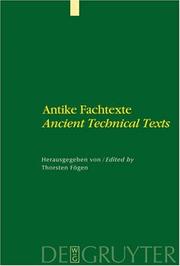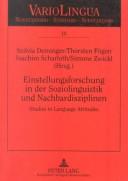| Listing 1 - 10 of 12 | << page >> |
Sort by
|

ISBN: 3110181223 9783110181227 3110912104 Publisher: Berlin ; New York, NY : Walter de Gruyter.
Abstract | Keywords | Export | Availability | Bookmark
 Loading...
Loading...Choose an application
- Reference Manager
- EndNote
- RefWorks (Direct export to RefWorks)
Dieser Band versammelt ausgewählte Beiträge einer Tagung zum Thema "Fachtexte und Fachsprachen in der Antike", die im März 2004 an der Humboldt-Universität zu Berlin abgehalten wurde. Die kulturhistorische Dimension der Fachtext-Forschung wird am Beispiel unterschiedlicher Ausprägungen der Gattung "Fachtext" in der griechisch-römischen Antike erhellt. Dabei wird der Umgang antiker Fachschriftsteller mit sprachlich-stilistischen (vor allem terminologischen) Aspekten ebenso untersucht wie die pragmatische Ebene von Fachtexten, so z.B. Struktur und Form, Intention und Publikum, die Rolle der Polemik (Selbststilisierung und Kritik von Fachgenossen) und das Verhältnis von Text und Illustration (bildliche Darstellungen, Graphiken, Skizzen). Die Beiträge sind teils auf Deutsch und teils auf Englisch abgefasst. This volume brings together revised papers that were presented at a conference, held at Humboldt University of Berlin in March 2004, on technical texts and technical languages in Graeco-Roman antiquity. The contributions investigate the cultural dimension of technical texts and their different manifestations. They analyse how ancient technical writers dealt with linguistic and stylistic, in particular terminological, features, but also focus on the pragmatic level of technical texts, e.g., their structure and form, their intentions and readers, as well as the role of polemics and the relationship between text and illustrations. The contributions are written in German and English.
Technology --- Applied science --- Arts, Useful --- Science, Applied --- Useful arts --- Science --- Industrial arts --- Material culture --- Greece --- Congresses --- Rome
Book
ISBN: 9783406592591 3406592597 2821846398 Year: 2009 Volume: 134 Publisher: C.H.Beck
Abstract | Keywords | Export | Availability | Bookmark
 Loading...
Loading...Choose an application
- Reference Manager
- EndNote
- RefWorks (Direct export to RefWorks)
Thorsten Fögen behandelt in dieser Studie vorrangig römische Fachtexte des ersten vor- und nachchristlichen Jahrhunderts und nähert sich der Frage nach dem Autorenbewußtsein und der Selbstdarstellung antiker Fachschriftsteller auf zwei Ebenen: Im ersten Teil liegt der Schwerpunkt auf einer synoptischen Diskussion antiker Zeugnisse zu den Charakteristika von Fachtexten und Fachsprachen. Dabei stehen sprachliche Mittel im engeren Sinne im Vordergrund, also lexikalische, morphologische und syntaktische, aber auch pragmatische Phänomene, die antike Autoren mit fachlichen Diskursen assoziieren. Im zweiten Teil folgen exemplarische Untersuchungen zu vier Fachtexten der frühen Kaiserzeit: Vitruvs „De architectura“, Columellas „De re rustica“, Plinius’ „Naturalis historia“ und Frontins „De aquaeductu urbis Romae“. Im Zentrum stehen die Formen der Selbstpräsentation der jeweiligen Verfasser gegenüber ihrem Lesepublikum und die dazu von ihnen verwendeten rhetorischen Strategien. Im einzelnen wird herausgearbeitet, wie sie sich von ihren Vorgängern abzusetzen versuchen und als Autorität inszenieren. In diesem Rahmen geht es nicht zuletzt um soziale und ethische Aspekte von Wissenschaft, wie z. B. Offenheit im Umgang mit Wissensbeständen, Erkenntnisfortschritt, den praktischen und politischen Nutzen von Fachwissen sowie den damit verbundenen materiellen Gewinn. Die Arbeit ist an der Schnittstelle von Sprach- und Literaturwissenschaft, Wissenschaftsgeschichte und Kultursoziologie angesiedelt. Thorsten Fögen analysiert antike Fachtexte als Zeugnisse soziokultureller Strukturen und damit die politisch-ideologischen Implikationen von Fachschriftstellerei, die sich aus der von ihnen entworfenen Weltanschauung, ihrem Verhältnis zur Tradition und dem von ihnen vertretenen Wertesystem identifizieren lassen.
Communication of technical information. --- Communication in science. --- Science, Ancient. --- Scientific literature --- Didactic literature, Latin --- Literature and technology --- Information technique --- Information scientifique --- Sciences anciennes --- Sciences --- Littérature didactique latine --- Littérature et technologie --- History and criticism --- Documentation --- Histoire et critique --- Communication of technical information --- Latin literature --- Communication in science --- Science, Ancient --- Languages & Literatures --- Greek & Latin Languages & Literatures --- History and criticism. --- Littérature didactique latine --- Littérature et technologie --- Ancient science --- Science, Primitive --- Science --- Communication in technology --- Technical communication --- Technical information, Communication of --- Communication in research --- Science communication --- Science information --- Scientific communications --- History --- Latin literature - History and criticism --- Fachtext --- frühe Kaiserzeit --- Selbstdarstellung
Book
ISBN: 3598776993 3110956454 9783598776991 Year: 2000 Volume: 150 Publisher: München K.G. Saur
Abstract | Keywords | Export | Availability | Bookmark
 Loading...
Loading...Choose an application
- Reference Manager
- EndNote
- RefWorks (Direct export to RefWorks)
Classical philology. --- Classical Latin language --- Sociolinguistics --- Sociolinguistics. --- Latin language --- Social aspects. --- Language awareness --- History. --- Cicero, Marcus Tullius. --- Linguistic awareness --- Metalinguistic knowledge --- Awareness --- Psycholinguistics --- Cicero, Marcus Tullius --- T︠S︡it︠s︡eron, Mark Tulliĭ --- Cyceron --- Cicéron --- Kikerōn --- Cicerón, M. Tulio --- Ḳiḳero --- Cicerone --- M. Tulli Ciceronis --- Cicéron, Marcus --- Cicerón, Marco Tulio --- Ḳiḳero, Marḳus Ṭulyus --- Tullius Cicero, Marcus --- Cicerone, M. T. --- Kikerōn, M. T. --- Cicerone, M. Tullio --- Cicero --- Cicero, M. T. --- Cyceron, Marek Tulliusz --- ציצרון, מארקוס טולליוס --- קיקרו, מארקוס טוליוס --- קיקרו, מרקוס טוליוס --- キケロ --- 西塞罗 --- Latin language - Social aspects.
Book
ISBN: 9783110471786 3110471787 9783110473490 3110473496 3110473038 9783110473506 311047350X 9783110473032 Year: 2016 Publisher: Berlin Boston
Abstract | Keywords | Export | Availability | Bookmark
 Loading...
Loading...Choose an application
- Reference Manager
- EndNote
- RefWorks (Direct export to RefWorks)
This interdisciplinary volume explains the phenomenon of nationalism in nineteenth-century Europe through the prism of Graeco-Roman antiquity. Through a series of case studies covering a broad range of source material, it demonstrates the different purposes the heritage of the classical world was put to during a turbulent period in European history. Contributors include classicists, historians, archaeologists, art historians and others.
Nationalism and the arts --- Art, Greco-Roman --- Nationalisme et arts --- Art gréco-romain --- History --- Political Aspects --- Histoire --- Aspect politique --- Art gréco-romain --- Political aspects --- Civilization, Greco-Roman. --- Greece --- Italy --- Antiquities. --- Greco-Roman civilization --- Civilization, Classical --- 1800-1899 --- Nationalism --- Consciousness, National --- Identity, National --- National consciousness --- National identity --- International relations --- Patriotism --- Political science --- Autonomy and independence movements --- Internationalism --- Political messianism
Book
ISBN: 3110544512 3110545624 9783110544510 9783110545623 3110544164 9783110544169 Year: 2017 Publisher: Berlin Boston
Abstract | Keywords | Export | Availability | Bookmark
 Loading...
Loading...Choose an application
- Reference Manager
- EndNote
- RefWorks (Direct export to RefWorks)
The seventeen contributions to this volume, written by leading experts, show that animals and humans in Graeco-Roman antiquity are interconnected on a variety of different levels and that their encounters and interactions often result from their belonging to the same structures, ‘networks’ and communities or at least from finding themselves together in a certain setting, context or environment – wittingly or unwittingly. Papers explore the concrete categories of interaction between animals and humans that can be identified, in what contexts they occur, and what types of evidence can be productively used to examine the concept of interactions. Articles in this volume take into account literary, visual, and other types of evidence. A comprehensive research bibliography is also provided.
Human-animal relationships. --- Animal-human relationships --- Animal-man relationships --- Animals and humans --- Human beings and animals --- Man-animal relationships --- Relationships, Human-animal --- Animals --- Greece --- Rome --- Religion.

ISBN: 363135391X Year: 2000 Publisher: Frankfurt am Main Lang
Abstract | Keywords | Export | Availability | Bookmark
 Loading...
Loading...Choose an application
- Reference Manager
- EndNote
- RefWorks (Direct export to RefWorks)
Book
ISBN: 9783110544169 Year: 2017 Publisher: Berlin : De Gruyter,
Abstract | Keywords | Export | Availability | Bookmark
 Loading...
Loading...Choose an application
- Reference Manager
- EndNote
- RefWorks (Direct export to RefWorks)
Animals --- Mythology, Classical. --- Human-animal relationships --- Animals (Philosophy) --- Religious aspects. --- Greece --- Rome --- Religion. --- Animals and civilization --- History --- Antiquities
Digital
ISBN: 9782821846395 Year: 2009 Publisher: München C.H. Beck
Abstract | Keywords | Export | Availability | Bookmark
 Loading...
Loading...Choose an application
- Reference Manager
- EndNote
- RefWorks (Direct export to RefWorks)
Book

ISBN: 9783110229929 3110229927 9783110229936 3110229935 1282934228 9786612934223 9781282934221 6612934220 Year: 2010 Volume: 286 Publisher: Berlin Boston
Abstract | Keywords | Export | Availability | Bookmark
 Loading...
Loading...Choose an application
- Reference Manager
- EndNote
- RefWorks (Direct export to RefWorks)
Wissenschaftliche Texte der "vormodernen" Welt konfrontieren die modernen Bearbeiter und Rezipienten mit besonderen Problemen: Eine Übertragung in den zeitgenössischen Wissenschaftsjargon ebnet womöglich die Fremdheit der Konzepte ungebührlich ein, während eine die Perspektive der Texte selbst betonende Wiedergabe Gefahr läuft, fachfremde Interessenten an inadäquate, oft veraltete, wenn auch leichter lesbare Übersetzungen zu verweisen. Wie wird man den Texten gerecht, ohne in die Falle einer gut gemeinten, aber fehlerhaften relativistischen Perspektive zu geraten? Was macht überhaupt die Wissenschaftlichkeit einer antiken Erkenntnisbemühung aus? Sind die Texte über die Feststellung hinaus, "wie es einst gewesen", für uns von Interesse? Ausgewiesene Kenner ihrer jeweiligen Fachgebiete bieten Fallstudien u. a. aus den Bereichen der Medizin, Astronomie, Mathematik sowie methodologische Überlegungen zur Lösung des Übersetzungsproblems.
Science, Ancient --- Scientific literature --- Translating and interpreting --- Learning and scholarship --- History --- History and criticism --- Translating --- Philosophy --- Learning and scholarship --History --To 1500 --Congresses. --- Science, Ancient --History --Sources --Congresses. --- Scientific literature --Greece --History and criticism --Congresses. --- Scientific literature --Middle East --History and criticism --Congresses. --- Scientific literature --Rome --History and criticism --Congresses. --- Scientific literature --Translating --Congresses. --- Translating and interpreting --Philosophy --Congresses. --- Physical Sciences & Mathematics --- Sciences - General --- Translating. --- History and criticism. --- Philosophy. --- Science literature --- Ancient science --- Science, Primitive --- Erudition --- Scholarship --- Science --- Civilization --- Intellectual life --- Education --- Learned institutions and societies --- Research --- Scholars --- Cultural History. --- Egyptology. --- History of Science. --- Philology. --- Science of Translation.
Book

ISBN: 9783110212532 3110212536 9783110212525 3110212528 9786612714627 1282714627 Year: 2010 Publisher: Berlin Boston
Abstract | Keywords | Export | Availability | Bookmark
 Loading...
Loading...Choose an application
- Reference Manager
- EndNote
- RefWorks (Direct export to RefWorks)
In the Graeco-Roman world, the cosmic order was enacted, in part, through bodies. The evaluative divisions between, for example, women and men, humans and animals, "barbarians" and "civilized" people, slaves and free citizens, or mortals and immortals, could all be played out across the terrain of somatic difference, embedded as it was within wider social and cultural matrices.This volume explores these thematics of bodies and boundaries: to examine the ways in which bodies, lived and imagined, were implicated in issues of cosmic order and social organisation in classical antiquity. It focuses on the body in performance (especially in a rhetorical context), the erotic body, the dressed body, pagan and Christian bodies as well as divine bodies and animal bodies. The articles draw on a range of evidence and approaches, cover a broad chronological and geographical span, and explore the ways bodies can transgress and dissolve, as well shore up, or even create, boundaries and hierarchies. This volume shows that boundaries are constantly negotiated, shifted and refigured through the practices and potentialities of embodiment.
Human body in literature --- Human body --- Body, Human --- Human beings --- Body image --- Human anatomy --- Human physiology --- Mind and body --- Body, Human, in literature --- Human figure in literature --- Social aspects --- Human body in literature. --- Corps humain --- Corps humain dans la littérature --- Aspect social --- Ancient Greek Literature. --- Body (Cultural Concepts). --- Classical Latin Literature. --- History of Ancient Arts.
| Listing 1 - 10 of 12 | << page >> |
Sort by
|

 Search
Search Feedback
Feedback About UniCat
About UniCat  Help
Help News
News